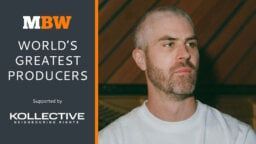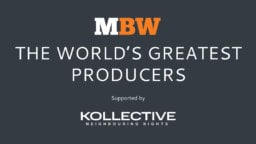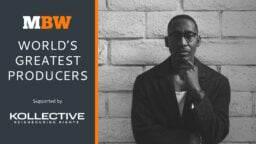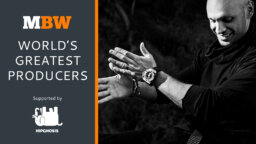MBW’s World’s Greatest Producers series sees us interview – and celebrate – some of the outstanding talents working in studios across the decades. World’s Greatest Producers is supported by Hipgnosis Song Management.
Salaam Remi is, by any measure, a World’s Greatest Producer.
A Grammy winner, he’s worked closely – and made timeless hits – with musical legends from Nas to Amy Winehouse, Alicia Keys, The Fugees, and many more. He’s also an accomplished music biz executive and entrepreneur.
And it’s as an entrepreneur that Remi (aka Salaam Remi Gibbs) recently hit MBW’s headlines: his music rights management company, Analog Metaverse, last month announced a global music publishing admin deal with Warner Chappell Music.
Analog Metaverse represents a catalog of around 2,000 high-quality songs, including many of Remi’s own productions. The firm’s song portfolio includes “Girl On Fire” by Alicia Keys, “Money In My Pocket” by Dennis Brown, “All I Want Is You” by Miguel and J. Cole, “Revolution” by Dennis Brown, “Fu-Gee-La,” by The Fugees, and “Here Comes the Hotstepper” by Ini Kamoze.
Remi is the latest interviewee on a ‘World’s Greatest Producers’-themed podcast with MBW founder Tim Ingham.
You can listen to that podcast above, or read abridged and edited highlights below…
I know you go way back with Warner Chappell CEO Guy Moot, but what were your reasons for picking Warner Chappell as your admin partner for Analog Metaverse?
A lot of it does come down to the head of the company… being able at least to speak to the head of company and for them also to see the vision for what you’re doing. I think it was very important for me to have that ongoing relationship, that we’ll be able to see eye to eye.
So it just felt like a proper fit, as I knew who all the players were. There are at least five or six people [at Warner Chappell] that I have a 20-plus year relationship with.
A well-worn story in the music business over the decades is that young creatives would take an upfront check and not thinking through what they were giving away – what it might mean for the next 10 or 20 years.
One day, when I was working at Sony, L.A. Reid said, ‘Hey, you’re going to appreciate this man. I just signed this paper.’ I was like, ‘What happened?’ He’s like ‘Man, I just got all my songs back.’ And I was like, ‘What do you mean?’ He’s like ‘I stopped producing, we did our deal with Warner Chappell years ago. I didn’t keep producing, so I never made the commitments. But hey, there was a 20 year conversion. I just got all the songs back. Don’t Be Cruel, the New Edition records, everything.’ And I was like ‘wow.’
Being able to see that day when your songs actually end up back in your hand, and then you have the option of what you want to do with them going forward…
What I’m doing with all of our clients [at Analog Metaverse] is really giving them a clear path on at least knowing what their options are, and not always to just focus on upfront cash and all those things. Really looking at what might be best for them. And everyone has to make their decisions on what’s best for them, but when it comes down to it, if you don’t know all the options clearly, that is the biggest problem I see.
These 30 years that you’ve been working in the business, you’ve seen the transition from CD to download to streaming. When you zoom out on that, on balance, do you think streaming has been a positive thing for songwriters and producers, or not?
I think it has.
I had the opportunity for five years to work at Sony, reporting to Doug Morris. He looked at me one day and said, ‘Salaam, you know what, I sold the same song on 45, LP, CD, digital download, YouTube, now we’re streaming. The Top 10 Songs of someone’s life. They will always keep going back to playing those top 10 songs in whatever format that they’re available in.’
What streaming did was make it so that you really could play a 90-year-old song, next to a 40-year-old song, next to a song from last week, without any need to manufacture. It just had to be digitally available. And the reality is that that aspect of it allows so many songs that would have been dormant – because there wouldn’t have been any marketing or… someone to go and reissue those songs, to print them again.
“What streaming did was make it so that you really could play a 90-year-old song, next to a 40-year-old song, next to a song from last week, without any need to manufacture. It just had to be digitally available.”
So I felt like, yes, the streaming [royalty] numbers need to be adjusted. [With] the master royalties… the major labels… have definitely a strong play on it. Now the publishing side is starting to catch up, but there’s still a long way to go so the songwriters can now benefit properly.
But the first thing was that people had to get used to the consumer now knowing that these songs are available, and looking for them. And now, after this streaming era, there will be another era, and that’s really [what the] name of my company [is about], Analog Metaverse – understanding what happened in the analog world, now we’re carrying that to whatever [is next], or whatever the next aspect of streaming will be.
What do you generally make of this frenzy of catalog buying that we’ve seen in the music industry over the last five-plus years?
It’s shown the financial world that there is intellectual property that is the real estate of the music business, that will continue to have value 20, 30 years down the road.
On the flip side of it, I felt that there were a lot of people who ran into [selling their catalog but] didn’t really see the full picture, that some of the value that they were receiving now, financially, also was going to [have a downside]. But it just depends on what their personal needs were at the time.
“I didn’t want to be in a position where [if] I want to do my life story, I have to ask [people] on Wall Street [to] use my songs, because now it’s just a commodity.”
I didn’t want to be in a position where if I want to do my life story [as a movie], I have to ask [people] on Wall Street to use my songs, because now it’s just a commodity.
When it’s about that, that’s a little dangerous to me, because of the fact that it can just be moved around. [That’s] already happened [in the music industry]: if you were on a smaller boutique label, and your label helped you, and now you’re sucked up in a big corporation, and you’re one of 55,000 titles [owned by this corporation and] you can’t even find a human to talk to about your life’s work.
But as far as the amount of money that’s been put into the space, I think it’s a positive thing.
I wanted to talk to you about Amy Winehouse. You had a very close working relationship with her. Why do you think she was such an exceptional talent? And what’s it been like for you to watch this new generation of fans start to discover her music and fall in love with it? That must be very fulfilling for you to watch.
The thing is, when I met Amy, I was at a different point… I had just lost my mom, I had just moved to Miami. I was winded… What had just happened to my life?
And then someone walked in and actually put a spark to it, at 18 years old, and was able to sit down and sing some stuff, and made me feel like, ‘Wow, ok, there’s something else for me to learn here and really take [a different approach to] Jazz-hip hop.’
[I once said to Amy] ‘You’re 27 and now I’m meeting all these new girls at 18. And they’re like, “I’ve been listening to Amy Winehouse my whole life, like since I was nine.”’ And she said, ‘Wait a minute. Oh, wow…’
The people that Amy was inspired by, some of them had passed on before she was born, and [Amy] will continue to inspire.
“I met Amy right after my 30th birthday, and she wasn’t here on my 40th. But the reality is that what she left… will be something that’s special, and she’s a special soul that I was blessed to be able to come in contact with.”
That really crystallized part of my job – it’s to help different people now create the frequencies and the songs and the lyrics that will last beyond their existence and beyond my existence, that will inspire people that we’ll never know. I think that is the core of creation.
I met Amy right after my 30th birthday, and she wasn’t here on my 40th. But the reality is that what she left, and what she continues to leave, just as with many other artists, will be something that’s special.
You talked about having lost yourself for a minute around the time your mom passed and you moved to Miami. What are the best ways you’ve found to break out of self doubt and get creative and start making progress again?
I don’t think I’ve really had a lot of self doubt. But what I would do is, if I would get bored in one space, I would just… go to another place.
I’ve been blessed with a father who was in the business, who was born in Trinidad, came to America, played guitar, he worked with Belafonte, he worked with The Fat Boys, he worked with a lot of R&B artists [like] Gloria Gaynor. He did pretty much all the genres that I worked on.
So I had a blueprint of someone who went through different phases. So for me, I’m able to say, well, I worked with some reggae artists, with some R&B artists, Amy Winehouse, Lauryn Hill. I switch genres, I just go to a whole other place.
“What I would do is, before I would get bored in one space, I would just… go to another place.”
Being a New Yorker, I felt like that’s really a cosmopolitan city where Jamaican culture, Latin culture, Black American soul culture, that’s all part of being a New Yorker to me, and I was able to just go place to place, go to big band even for a while. ‘Wow, we’re at Carnegie Hall, this is what we’re doing now.’
And it gave me the challenge of learning something new. And I think that childlike curiosity is what actually drove me in every different way, even when it came to being an executive.
So I feel that, whenever there’s a block, it just means you need to learn something.
You said May 14, 2022 – your 50th birthday – was the last time you produced. Do you have any ambitions left to fulfill in music?
That date was important to me because I had my first record out with my dad, with Kurtis Blow in ‘86 [as keyboard player on Blow’s Kingdom Blow]. So it was a 34-year career. That’s a pension!
During the pandemic, some of the top artists were asking me to come out and work with them in L.A., Hawaii, different places, and I was like, ‘I’m not coming out of my house. Forget about it.’
I got to a place where I felt like, ‘You know what? I’ve made enough records. So if I make anything now, it should really be great.’
I started teaching in 2018 with Serona Elton at the Frost School of Music at the University of Miami, and that’s where I met Josephine Westphal [Analog Metaverse’s VP of Royalties and Administration] and also Kwame Kandekore [Head of Legal and Business Affairs].
And it was a great thing for me, because seeing other people now be able to do things… it’s like sitting on this perch and waiting for a young Mike Tyson to walk up. You go, ‘You know what, kid? You can do it. You’re the greatest.’ Whether they know it or not, they could be the greatest!
“I really want to … plant a tree, not knowing who’s going to bear the fruit, who’s going to eat the fruit from it, or see the shade. That’s the goal for me.”
I feel really proud when I’m able to see somebody else fulfill their dream. You don’t have to fulfill my dream. That’s the way I feel about what I have to do in music – creating spaces where the information that Analog Metaverse is helping to make available to more people, they’re going to take this information and do better with it for whatever they want to do.
I [work with] some younger producers who really want this, and they really are on it, the same way I felt in my 20s and teens, when I wanted to be in the studio 90 hours a day. There wasn’t enough hours in the day for what I wanted to create. So I let them go with that passion, and kind of just coach them from the sidelines.
I really want to … plant a tree, not knowing who’s going to bear the fruit, who’s going to eat the fruit from it, or see the shade. That’s the goal for me.
I learned a lot from great people, every conversation that I’ve had with every musician, every engineer, to [executives like] Rob Stringer to Sir Lucian Grainge, to Jeff Fenster to Barry Weiss, anyone I’ve had a conversation with, now I can put that information back into someone else who might not even know anything about those people, but now that information keeps getting passed down.
If you had a magic wand that let you change anything you want about the music business, what would you change?
I would definitely push the transparency button. If we all knew what we were creating was worth, then we would behave differently about how to make it work.
I feel like there are too many cloaks. The more transparent the business becomes, and the more that everyone sees what they’re worth, I feel like it’s going to make a better business and a more creative business, rather than 10 people benefiting and thousands of people just walking into a wall.
That’s really what the goal is to me. And I feel like that’s really what I’m looking for – transparency, absolute transparency. Because even when you say ‘This is in my contract,’ you also have to go through insurance company [type] hoops in order to get paid for it.




